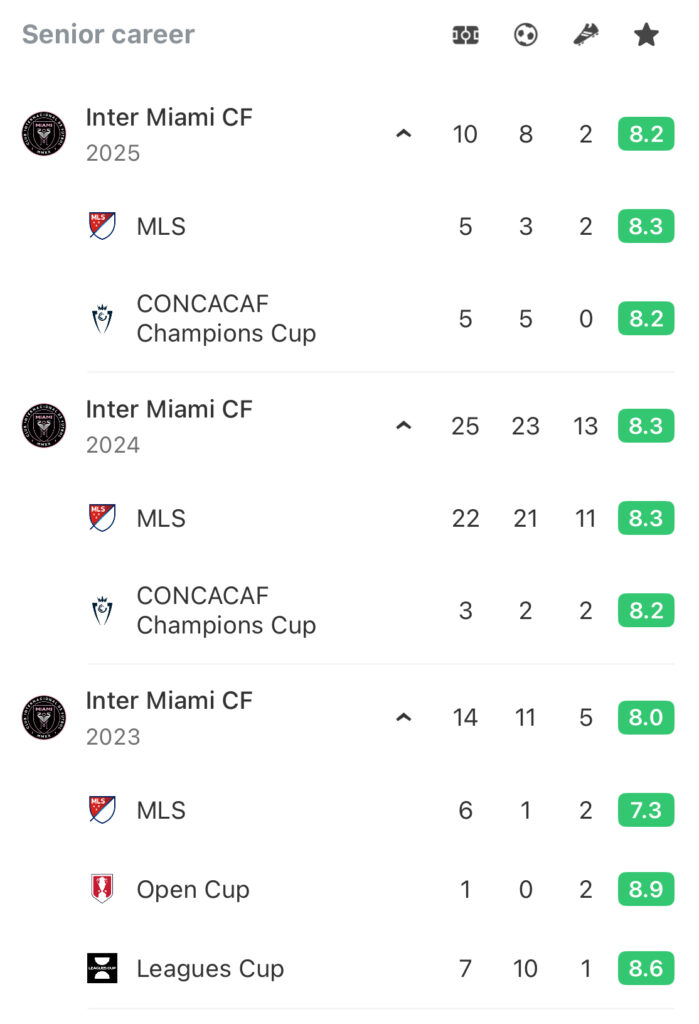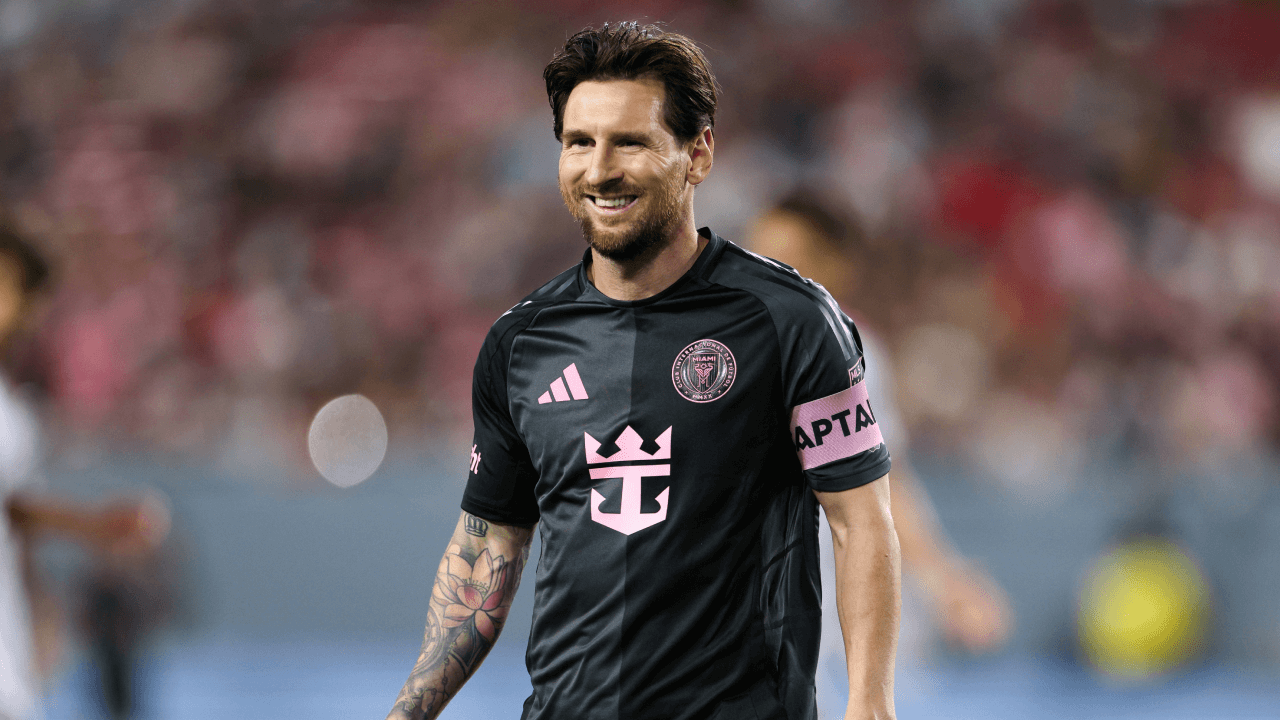Last Sunday night in Chicago, over 62,000 fans filled Soldier Field to watch a 0-0 draw. That wouldn’t normally make headlines. But when Lionel Messi is on the pitch, normal rules don’t apply.
Messi’s presence helped to break the Chicago Fire’s single-game attendance record and that has become a theme since his arrival in July 2023. From Atlanta to Kansas City, stadiums are bursting at the seams when Inter Miami come to town. His name is the headline, the spectacle, the reason fans fly across states just to catch a glimpse.
Messi has not just elevated Inter Miami, he’s redefined the ceiling of what’s possible for the American game. Attendance records broken. Viewership has spiked. Merchandise sales have soared. Apple TV, which signed a $2.5 billion deal with MLS before Messi’s arrival, is now enjoying a much-needed boost in subscriptions to its MLS Season Pass.

The 37-year-old Argentinian has scored goals, notched assists, and captured imaginations. But perhaps most importantly, he’s lent MLS something it has craved for decades: credibility, inside and outside the U.S. borders.
Yet here’s the looming question no one in the league office can afford to ignore: What happens when Messi stops playing?
MLS has always flirted with star power. From David Beckham’s groundbreaking arrival in 2007 to the brief stints of Thierry Henry, Zlatan Ibrahimović, and Kaká, the league has used ageing global icons to draw attention.
But Messi is different. He’s not just a footballer, he’s a global cultural figure and in the argument for the greatest to ever do it. With half a billion followers on Instagram alone, his influence transcends sport. But, there’s a looming expiration date.
So what then?
The concern is not just hypothetical. History has already shown what happens when a league becomes too reliant on one icon. Interest in MLS stagnated in the years following Beckham’s departure, another huge cultural influence at the time. The fanfare was immense, but once the buzz wore off and Beckham moved on, international media and many casual viewers followed suit.
Messi’s retirement won’t just be a football story, it will be a cultural moment. Attention will drop. Stadiums will stop selling out just because Inter Miami are in town. Brands may hesitate, and broadcasters will need new hooks.

The league is understandably milking this era. But unless it uses the spotlight to prepare for what comes next, the afterglow could fade fast. I’m sure the league office has been thinking about this for some time, but there are some areas where I believe the league can evolve and develop its unique identity, without depending on a single superstar.
First, the league must strengthen club brands, not just individual players. Too many MLS teams still operate without a clear identity on the global stage. In Europe, even chasing-pack clubs like Fiorentina or Real Betis carry rich narratives and emotional resonance. Of course, they have history on their side, but Inter Miami is setting the tone on how to approach things in newer markets, not just thanks to Messi, but because of a brand built around the culture and vibrancy of Miami itself, admittedly, it has the advantage of being in a globally attractive city to begin with. The league should push other clubs to find stronger hooks and encourage them to embrace storytelling, fashion, and music to build lasting cultural value, not just locally but globally.
Second, MLS must double down on developing and exporting young talent. While Messi has brought attention, serious credibility comes from nurturing future stars. This model works when backed by consistent investment and smart infrastructure. Players like Alphonso Davies and Tyler Adams are examples of this. More recently, we’ve seen attention on Cavan Sullivan, too. These are good examples, but it’ll take a lot more.

The league needs to deepen that pipeline and maybe even rethink how it introduces its rising stars to the world. There’s room for storytelling here, perhaps through behind-the-scenes docuseries that spotlight the journey of future talent and take some cues from Ryan Reynolds’ storytelling playbook. The Gen-Z generation is as enamoured by personalities as they are by football ability; there’s an opportunity to tap into that connection and think about entertainment as the hook that introduces the next generation of MLS talent.
Lastly, the league needs to embrace cultural capital. We live in a world where influence drives attention. Inter Miami have capitalised on this brilliantly, celebrities aren’t just attending for the game, they’re attending to be seen. That visibility has translated into global awareness. It’s a model other clubs should study. Whether it’s collaborating with local musicians or aligning with regional tastemakers, there’s value in meaningful cultural crossover. In the NBA, we’re used to seeing who’s courtside as much as what happens on the court. For MLS, tapping into that familiar rhythm could open the door to more mainstream relevance in the U.S. market and beyond.

Inter Miami has mastered this. Celebrities flock to their matches to be seen next to Beckham and Messi. That visibility has given the club a cultural relevance most MLS teams could only dream of. The league should look across the MLS club network and think strategically: how can they utilise the collective of culturally relevant figures, already in their ecosystem, in an authentic way?
Will Ferrell, Matthew McConaughey, Reese Witherspoon, Oscar de la Hoya, and many other A-list U.S. sports and entertainment figures hold shares in MLS clubs. They should all come together, with the league, for the shared mission of growing the league and the franchises through a creative global marketing strategy, rather than working individually to build their own club brands.
Some of these ideas might not feel traditional to football purists, but MLS, building in this era, needs to look beyond tradition. If it wants a bigger share of attention, not just within football but across the entire U.S. sports landscape, it has to play a different game. Unlike most countries, it’s not just competing with other football leagues, it’s up against the NFL, NBA, MLB, and NHL on home soil. Imagine another sport trying to pull you away from football; that’s the uphill battle MLS faces every day.
The 2026 FIFA World Cup, hosted by the U.S., Canada, and Mexico, is the perfect bridge between the Messi era and whatever comes next. By then, Messi will likely be in his final season or recently retired. The event will bring a once-in-a-generation spotlight.
MLS must use it to reposition the league as a serious player on the global football and entertainment map. That means smart marketing that convinces World Cup viewers to stick around once the tournament is over.
Messi won’t play forever. But what he’s done is give MLS unprecedented exposure; the World Cup provides another huge boost. The question now is what the league builds on top of those foundations.
(Images from IMAGO)
You can follow every game from MLS on FotMob – with in-depth stat coverage including xG, shot maps, and player ratings. Download the free app here.
